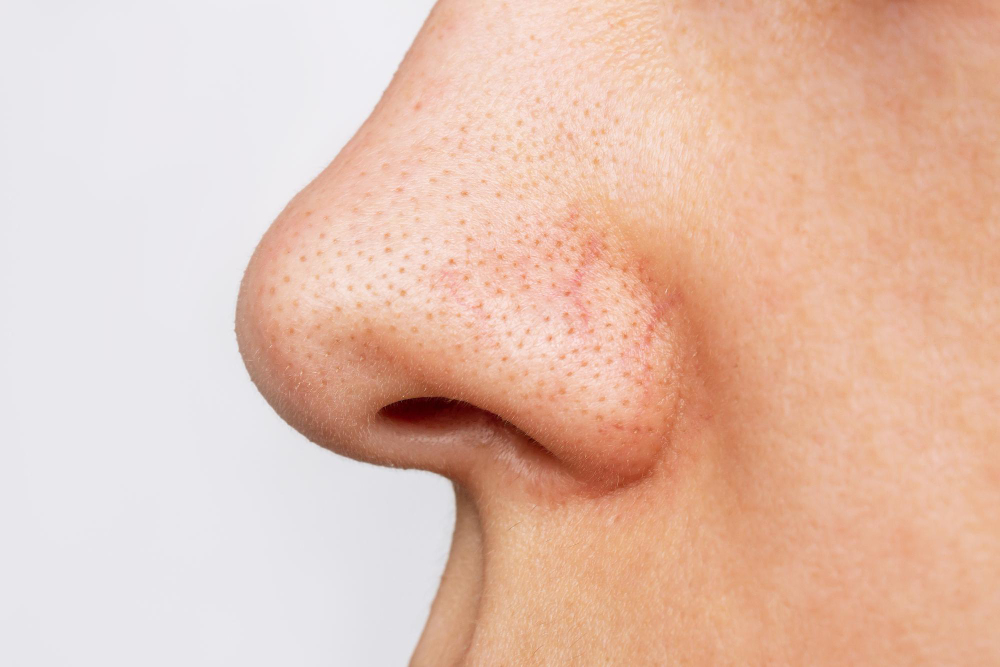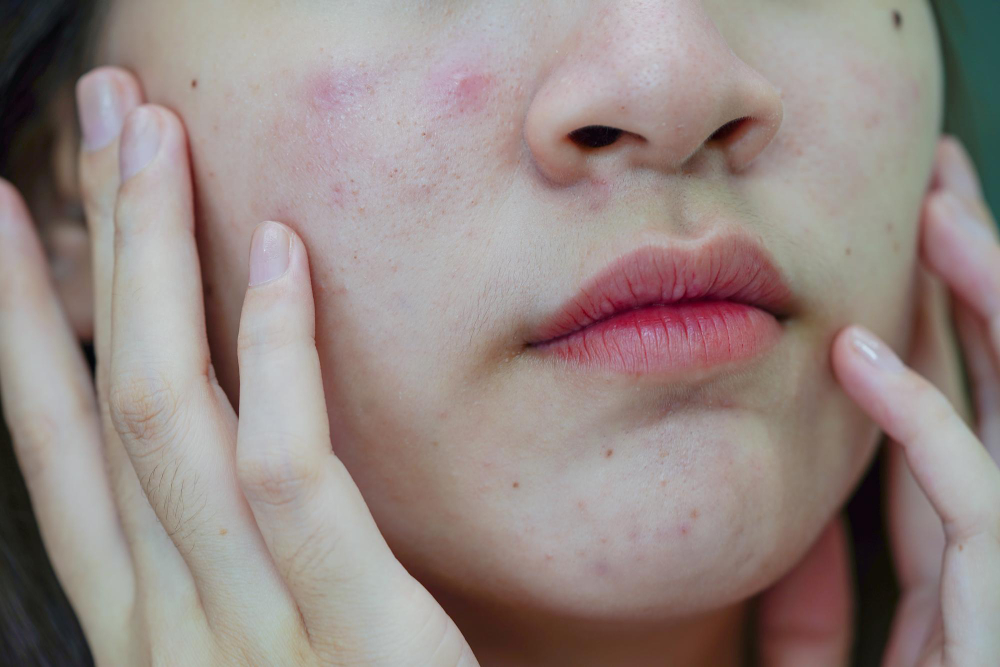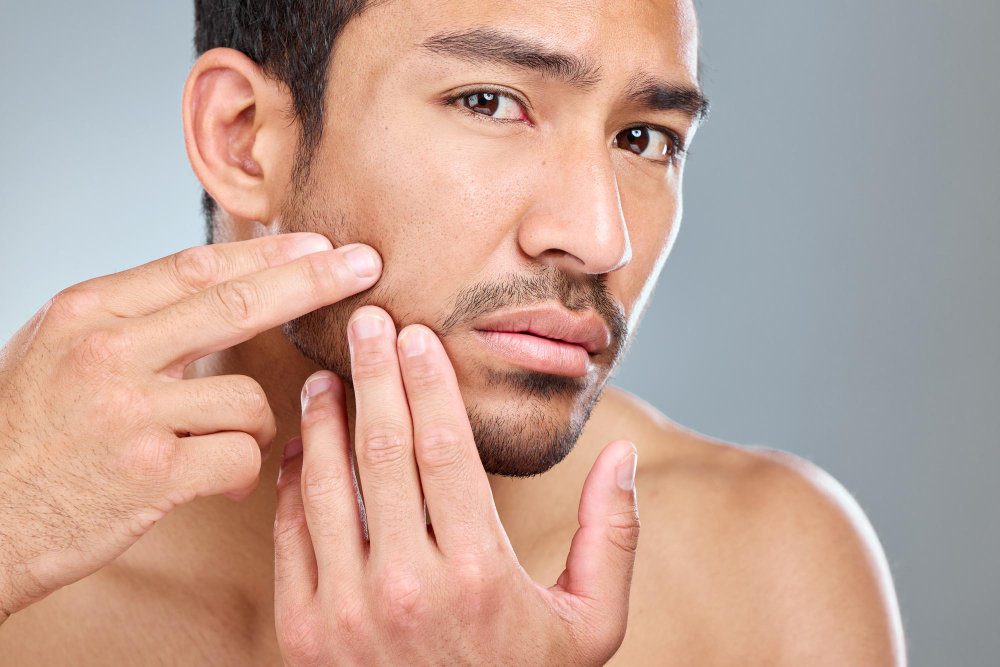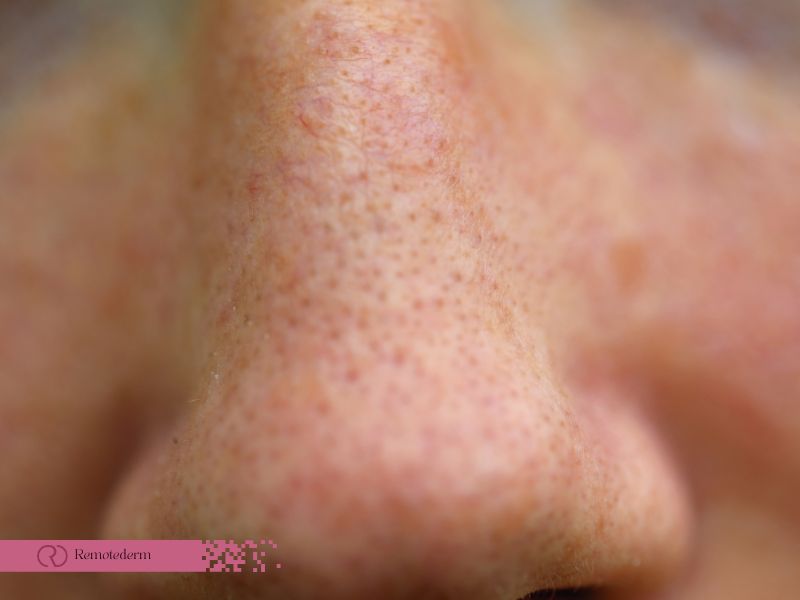Blackheads are a common skin concern that can be frustrating and embarrassing for those who suffer from them. These small, dark bumps on the skin’s surface can appear on any part of the body, but are most common on the face, particularly on the nose, chin, and forehead. While not usually painful or dangerous, blackheads can make the skin feel rough and bumpy, enlarge pores, and make it look dull and tired. In this article, we’ll break down the causes, symptoms, prevention, and treatment options for blackheads, including topical medications, professional treatments, facial cleansing, and exfoliation.
Understanding Blackheads
Blackheads are a common type of acne that appear as small, dark bumps on the skin’s surface. They typically form when oil and dead skin cells clog the hair follicles on the face, causing them to become blocked and oxidized. Blackheads can be especially noticeable on the nose, chin, and forehead, but they can appear anywhere on the face.

While blackheads are not usually painful or dangerous, they can be frustrating and make people feel self-conscious about their appearance. Many people try to get rid of blackheads by squeezing or picking at them, but this can actually make the problem worse and lead to scarring or infection.
Don’t let acne outbreaks and scarring hold you back – read to learn how to prevent and treat them effectively with Remotederm!
Symptoms of Blackheads
Blackheads can occur on various parts of the body, including the face, chest, and back. They typically appear as small, dark bumps on the skin’s surface. Some of the common symptoms of blackheads on the face include:
- Small, dark bumps on the skin’s surface: Blackheads are characterized by their dark color, which is caused by the oxidation of the oil and dead skin cells that clog the hair follicle.
- Rough, uneven skin texture: Blackheads can make the skin feel rough and bumpy, especially in areas where they are clustered together.
- Enlarged pores: The hair follicles that are clogged with oil and dead skin cells can become enlarged and visible on the skin’s surface.
- Dull, lackluster skin: Blackheads can give the skin a dull, tired appearance, as they reflect less light than healthy, clear skin.

In addition to these physical symptoms, blackheads can also have a psychological impact on those who suffer from them.
Causes of Blackheads
Blackheads are a common type of acne that appear as small, dark bumps on the skin’s surface. They are caused by the buildup of oil, dead skin cells, and bacteria in the hair follicles. When the hair follicle becomes clogged, the oil and dead skin cells mix together and oxidize, resulting in a blackhead. Some of the common causes of blackheads on the face include:
- Excessive Oil Production: People with oily skin are more prone to blackheads as their skin produces more oil, making it easier for the pores to become clogged.
- Hormonal Changes: Hormonal changes during puberty, pregnancy, and menstrual cycle can cause an increase in oil production, leading to more blackheads.
- Poor Diet: A diet high in sugar and processed foods can cause inflammation in the body, which can trigger excess oil production and blackheads.
- Medications: Certain medications, such as steroids and birth control pills, can cause hormonal imbalances and lead to blackheads.
- Skin Care Routine: Not cleansing your skin properly or regularly can lead to a buildup of oil and dead skin cells, which can contribute to blackheads. Additionally, using products that are too harsh or abrasive can cause irritation and inflammation, which can worsen the problem.
- Genetics: Some people may be more predisposed to blackheads due to their genetics. If your parents or other family members have a history of blackheads or acne, you may be more likely to develop them as well.
- Environmental Factors: Exposure to pollution, humidity, and other environmental factors can also contribute to the development of blackheads. For example, living in a humid climate can increase oil production and make it easier for pores to become clogged.
- Stress: Chronic stress can have a negative impact on your skin, including increasing oil production and inflammation. This can make you more prone to blackheads and other types of acne.
- Pore-Clogging Products: Certain hair and skincare products, such as heavy moisturizers and oily hair products, can clog pores and contribute to blackheads. Selecting non-comedogenic cosmetics that won’t clog your pores is crucial.
- Touching Your Face: Touching your face frequently can transfer oil and bacteria from your hands to your skin, which can contribute to blackheads. Additionally, picking at blackheads or other types of acne can cause inflammation and scarring.

Click on this article about comedones to learn more about this skin disease. In order to prevent and treat blackheads on the face, it’s important to understand their underlying causes.
Blackhead Treatment
Blackheads on the face can be a frustrating and stubborn skin concern to deal with. Fortunately, there are a variety of treatment options available to help get rid of blackheads and prevent them from returning. The following are some of the best methods for treating blackheads:
- Topical medications:
There are many over-the-counter and prescription topical medications available that can help to reduce the appearance of blackheads on the face. These medications typically contain active ingredients like salicylic acid or benzoyl peroxide, which work to exfoliate the skin and unclog pores. Topical retinoids are also effective in reducing blackheads as they help to unclog pores and reduce oil production. - Professional treatments:
For more severe cases, professional blackhead treatment may be necessary. Dermatologists and estheticians can perform procedures like extractions or chemical peels to help unclog pores and improve the overall appearance of the skin. Microdermabrasion is also a popular treatment option, as it works to exfoliate the skin and remove dead skin cells and oil that can contribute to the formation of blackheads. - Facial cleansing:
Proper cleansing of the face is important in preventing and treating blackheads. Using a gentle, non-comedogenic cleanser twice daily can help to remove excess oil and dirt from the skin, which can contribute to the formation of blackheads. As abrasive scrubs and exfoliants might irritate the skin and cause more outbreaks, avoid using them. - Exfoliation:
Regular exfoliation of the skin can help to remove dead skin cells and prevent the formation of blackheads. However, it is important to be gentle when exfoliating, as harsh scrubs or exfoliants can damage the skin and exacerbate blackheads. - Clay masks:
Clay masks are an effective blackhead treatment optionas they help to absorb excess oil and unclog pores. Look for masks that contain ingredients like kaolin clay or bentonite clay, which are known for their ability to absorb oil and impurities from the skin.

Overall, treating blackheads on the face requires a combination of good skin care habits and targeted treatments. With the right approach, it is possible to get rid of blackheads and achieve clear, healthy-looking skin.
Prevention of Blackheads on Face
Preventing blackheads on the face is an important step in maintaining clear, healthy-looking skin. While it can be challenging to completely eliminate blackheads, there are several strategies that can be effective in preventing their formation. The following are some of the most successful preventative strategies:
- Proper cleansing:
Cleansing the face twice daily with a gentle, non-comedogenic cleanser can help to remove excess oil and dirt from the skin, which can contribute to the formation of blackheads. Be sure to rinse the skin thoroughly after cleansing to avoid leaving any residue behind. - Exfoliation:
Regular exfoliation of the skin can help to prevent the formation of blackheads by removing dead skin cells and unclogging pores. However, it is important to be gentle when exfoliating, as harsh scrubs or exfoliants can damage the skin and exacerbate blackheads. Once or twice a week exfoliation is usually enough. - Moisturizing:
Keeping the skin properly moisturized is important in preventing blackheads. When the skin is dry, it can produce more oil to compensate, which can lead to clogged pores and blackheads. Look for oil-free, lightweight moisturizers that will not clog your pores. - Sun protection:
Protecting the skin from the sun’s harmful UV rays is important in preventing blackheads. UV damage can lead to inflammation and increased oil production, which can contribute to the formation of blackheads. Be sure to wear a broad-spectrum sunscreen with an SPF of at least 30, and reapply every two hours when outdoors. - Avoiding pore-clogging products:
Certain makeup, hair care products, and skin care products can clog pores and contribute to the formation of blackheads. Look for products labeled “non-comedogenic” or “oil-free” to avoid exacerbating blackheads.

Conclusion
In conclusion, blackheads are a common skin concern that can make people feel self-conscious about their appearance. They are caused by the buildup of oil, dead skin cells, and bacteria in the hair follicles. Understanding the underlying causes and symptoms is important to prevent and treat blackheads. While there are various treatment options available, including topical medications, professional treatments, facial cleansing, and exfoliation.

Remotederm offers an online dermatology consultation service that can be accessed from anywhere, eliminating the need for long waits to visit dermatologists in person. With the right treatment and prevention methods, it is possible to get rid of blackheads and achieve clear, healthy-looking skin.
FAQs
- Can stress cause blackheads?
Yes, chronic stress can increase oil production and inflammation, which can make you more prone to blackheads.
- Where do blackheads most commonly occur?
Blackheads are most commonly found on the face, particularly on the nose, chin, and forehead, but can appear on any part of the body.
- Can squeezing blackheads make them go away?
Squeezing blackheads can actually make the problem worse and lead to scarring or infection.
- Can blackheads go away on their own?
Blackheads can sometimes go away on their own, but it can take a long time and may not be very effective.
- Can diet affect blackheads?
A diet high in sugar and processed foods can cause inflammation in the body, which can trigger excess oil production and blackheads.
- Are there any professional treatments for blackheads?
Yes, professional treatments such as extractions, chemical peels, and microdermabrasion can help unclog pores and improve the appearance of the skin.
- How can touching your face contribute to blackheads?
Touching your face frequently can transfer oil and bacteria from your hands to your skin, which can contribute to blackheads. Additionally, picking at blackheads or other types of acne can cause inflammation and scarring.
